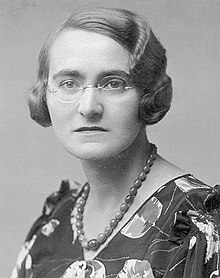Lidia Zamenhof | |
|---|---|
 Lidia Zamenhof before the Nazi German invasion of Poland | |
| Born | 29 January 1904 |
| Died | 1942 (aged 37–38) |
| Nationality | Polish |
| Other names | Lidja |
| Known for | Activity in Esperanto movement and Baháʼí Faith |
| Parent(s) | L. L. Zamenhof (1859–1917) Klara Zamenhof (1863–1924) |
Lidia Zamenhof (Esperanto: Lidja Zamenhofo; 29 January 1904–1942) was a Jewish Polish writer, publisher, translator and the youngest daughter of Klara (Silbernik) and L. L. Zamenhof, the creator of Esperanto. She was an active promoter of Esperanto as well as of Homaranismo, a form of religious humanism first defined by her father.
Around 1925 she became a member of the Baháʼí Faith.[1] In late 1937 she went to the United States to teach that religion as well as Esperanto. In December 1938 she returned to Poland, where she continued to teach and translated many Baháʼí writings.[2] She was murdered at the Treblinka extermination camp during the Holocaust.[3]
- ^ Smith, Peter (2000). "Zamenhof, Lidia". A concise encyclopedia of the Baháʼí Faith. Oxford: Oneworld Publications. pp. 368. ISBN 1-85168-184-1.
- ^ "Famous Baha'is". adherents.com. 2005-12-06. Archived from the original on October 19, 2000. Retrieved 2008-03-16.
{{cite web}}: CS1 maint: unfit URL (link) - ^ "Lidia Zamenhof, a cosmopolitan woman and victim of the Holocaust". blogs.bl.uk. Retrieved 2022-10-11.